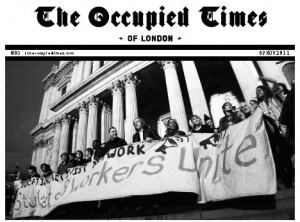One year on from the demonstration that culminated in the trashing of Millbank, students are again on the march. It would be easy to dismiss the protests then as a failure. Fees were raised and EMA scrapped despite mass opposition, but what ‘began’ then has mutated throughout the year, leading to – but not ending – in what we are doing here, now.
It is often claimed the occupations currently taking place around the world were spawned by events in Tahrir Square, but in truth, the lineage can be traced right back through a global history of protest and social movements – each helping to inspire the next.
Something did begin though – or was reawakened – with the many student occupations of last year. Some of those who occupied UCL and other universities are here now at St Paul’s and Finsbury Square, passing on the lessons they learned.
Since then we’ve seen March 26th, repeated UK uncut actions, the summer riots, and now, another student march and plans for collective strike action later this month – the scale of which hasn’t been seen for a generation.
While the complexity-fearing mainstream media dismissed the riots as the result of ‘greed’ and ‘thuggery’, a more nuanced analysis might point to a political and economic climate stripping people of hope.
Society is comprised of a variety of people with different ideas, means and privileges, so our responses to a government turning back the clock thirty years are equally diverse. Some strike, some march, some occupy, and some riot. We might not condone the actions of others, but neither should we condemn them because they differ from our own.
If we had genuine democracy, we wouldn’t have a government privatising the NHS when there was no mention of it in pre-election manifestos. We wouldn’t have a deputy prime minister who promised not to raise student fees, and then did exactly that. And we wouldn’t be camped out in front of St Paul’s creating a democracy of our own.
Faced with these betrayals, and the prospects of no jobs, no housing and no future, the fear that ordinarily keeps us in line is banished, and replaced with a sense of vital urgency.
Today we march in protest at those who want to deny us our futures, because, as Martin Luther King said, “Our lives begin to end the day we become silent about things that matter.”





